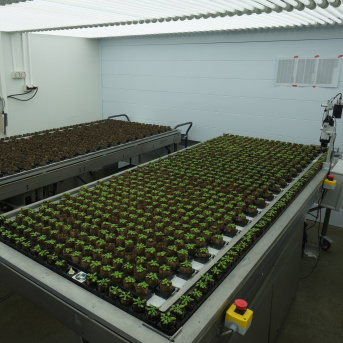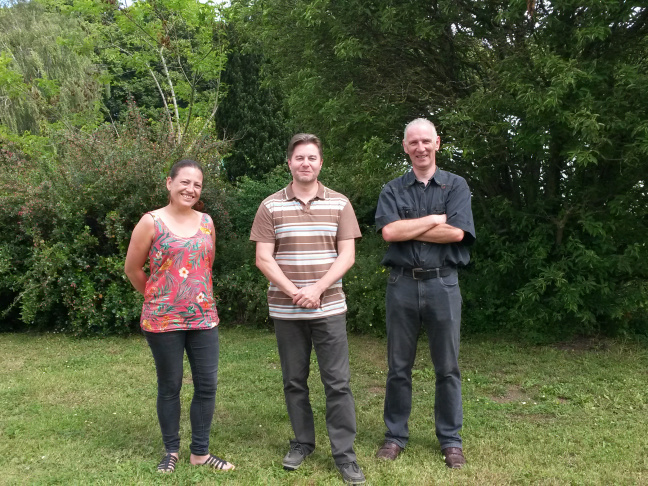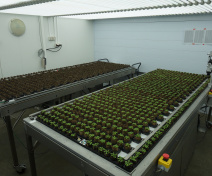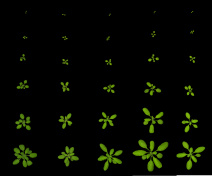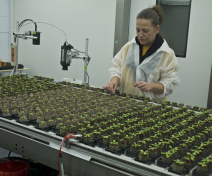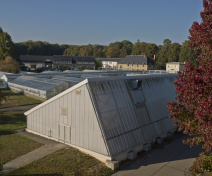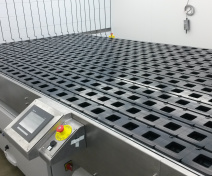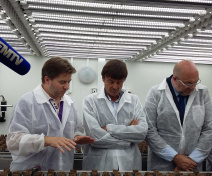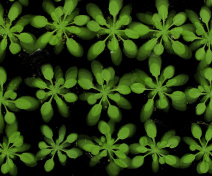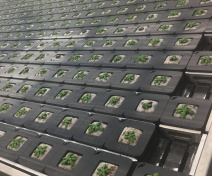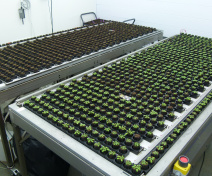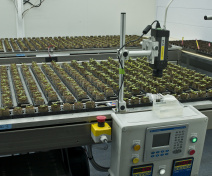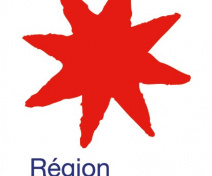The PO-Phenoscope exploits a unique robot designed to grow and phenotype small-sized plants under controlled conditions: the Phenoscope. Our platform is open to the community and attentive to your needs !
Biological Question
Since 2016, the PO-Phenoscope platform is dedicated to high-throughput growth analysis of small plants, essentially Arabidopsis thaliana. The IJPB has developed and patented its own system for automated growth and development analysis of Arabidopsis plants under controlled environmental conditions.
Two Phenoscope robots are currently in operation on the platform, allowing to follow ~1,500 individual plants at the vegetative stage in a fully controlled climatic growth chamber with white-LED lighting. Plants are constantly circulated on the Phenoscope table, allowing to balance micro-environmental variations, and each pot is weighed and watered every 4 hours, allowing application of individually-adjusted water and nutrition scenarios defined by the user. An imaging station (visible + infrared; hyperspectral to come) allows to image each plant every day (or twice a day) and to quantify its phenotypic response to environmental factors. All experimental parameters, images and measures are stored in a dedicated information system database. The Phenoscope robots allow for high reproducibility and throughput that would not be possible to achieve together by hand (Tisné et al., TPJ, 2013). Environmental parameters that we are used to play with on the platform are drought, N stress, salt stress. Phenotypic parameters that we typically extract are those related to rosette growth and morphology, leaf colour and temperature.
A larger version of the Phenoscope ('XL') able to accommodate plants beyond flowering initiation (or moderately larger species) has been designed and built and is currently under testing.
Societal and economical impacts
Phenoscopes are typically best exploited in quantitative genetics approaches (QTL, GWAS), mutant screens, or any other large-scale experiment that require the comparison of hundreds of individuals in different watering environments. They can also be useful for a detailed characterisation of a small number of specific lines, for the establishment of response curves against multiple gradual stress treatments, and for the production of high-quality leaf material in view of detailed profiling (e.g. transcriptomics, metabolomics, proteomics).
The PO-Phenoscope staff includes 3 permanent agents, including an automation specialist / informatician (Olivier Zurfluh), an assistant-engineer biologist taking care of the experiments (Elodie Gilbault) and the scientist in charge (Olivier Loudet).
More details at this link
Since 2016, the PO-Phenoscope platform is dedicated to high-throughput growth analysis of small plants, essentially Arabidopsis thaliana. The IJPB has developed and patented its own system for automated growth and development analysis of Arabidopsis plants under controlled environmental conditions.
Two Phenoscope robots are currently in operation on the platform, allowing to follow ~1,500 individual plants at the vegetative stage in a fully controlled climatic growth chamber with white-LED lighting. Plants are constantly circulated on the Phenoscope table, allowing to balance micro-environmental variations, and each pot is weighed and watered every 4 hours, allowing application of individually-adjusted water and nutrition scenarios defined by the user. An imaging station (visible + infrared; hyperspectral to come) allows to image each plant every day (or twice a day) and to quantify its phenotypic response to environmental factors. All experimental parameters, images and measures are stored in a dedicated information system database. The Phenoscope robots allow for high reproducibility and throughput that would not be possible to achieve together by hand (Tisné et al., TPJ, 2013). Environmental parameters that we are used to play with on the platform are drought, N stress, salt stress. Phenotypic parameters that we typically extract are those related to rosette growth and morphology, leaf colour and temperature.
A larger version of the Phenoscope ('XL') able to accommodate plants beyond flowering initiation (or moderately larger species) has been designed and built and is currently under testing.
Societal and economical impacts
Phenoscopes are typically best exploited in quantitative genetics approaches (QTL, GWAS), mutant screens, or any other large-scale experiment that require the comparison of hundreds of individuals in different watering environments. They can also be useful for a detailed characterisation of a small number of specific lines, for the establishment of response curves against multiple gradual stress treatments, and for the production of high-quality leaf material in view of detailed profiling (e.g. transcriptomics, metabolomics, proteomics).
The PO-Phenoscope staff includes 3 permanent agents, including an automation specialist / informatician (Olivier Zurfluh), an assistant-engineer biologist taking care of the experiments (Elodie Gilbault) and the scientist in charge (Olivier Loudet).
More details at this link
